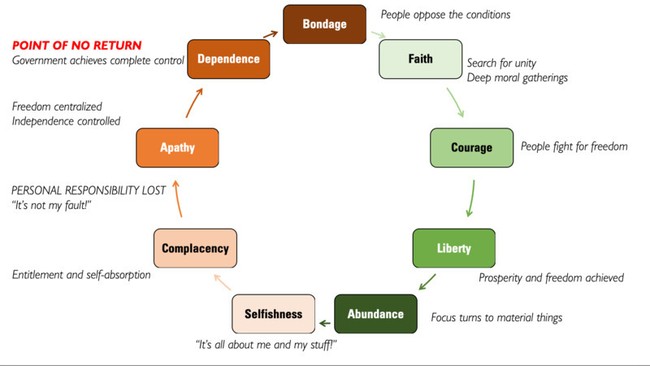As many did, last night, I watched the first GOP primary debate. These things start early for us here in the Great Land, being as we are an hour behind West Coast time, so at about 4:30 in the sunny, beautiful Susitna Valley summer afternoon, I walked back over to the office and logged in, along with my fellow RedStaters, to a debate night live blog. It was a great time; there were many great observations by both RedState contributors and our readers, and I look forward to the next such event with enthusiasm.

You can see that live blog, preserved for posterity, here. My colleagues have already summed up the debate, as well as the Tucker Carlson/Donald Trump interview, in their usual excellent manner. See the links here:
Tucker Carlson and Donald Trump Cover a Lot of Ground During Wide-Ranging Interview
GOP Debate and Abortion: Despite Mixed Responses, a Culture of Life Should Be the Goal
Vivek Gets Rocked - and Clocked - at First GOP Presidential Debate
The Reason Everyone Is Piling on Vivek Ramaswamy
Trump Claims Debate Victory, and He Has Some Incredible Numbers to Support the Claim
Let's Talk About the GOP Debate and North Dakota Governor Doug Burgum
There will doubtlessly be more through the day as the analyses of the debate and reactions to it continue. But a comment made by one of the candidates last night concerned me, and through much of a restless night, it began to bother me more and more, mostly because I couldn't convince myself he was wrong.
During the debate, at 20:36, Florida Governor Ron DeSantis said:
Our country is in decline. This decline is not inevitable, it’s a choice. We need to send Joe Biden back to his basement and reverse American decline. And it starts with understanding we must reverse Bidenomics so that middle class families have a chance to succeed again. We cannot succeed as a country if you are working hard and you can’t afford groceries, a car or a new home while Hunter Biden can make hundreds of thousands of dollars on lousy paintings. That is wrong.
This was a theme the Governor hit repeatedly throughout the debate. He has been making this point for a while now.
The more I thought about this statement, and the current state of affairs in the United States, the more it bothered me, to the point where it cost me much of a night's sleep. Why? Because of an 18th-century Scotsman named Alexander Fraser Tytler, who came up with something now known as the Tytler Cycle, which described the rise and fall of societies. That cycle takes this form:
 One could, and evidently, Governor DeSantis does, argue that we are somewhere in the Apathy and Dependence phases of this cycle. It's not hard to arrive at this conclusion: Our major cities are melting down, corruption in elected officials is rampant, and equal treatment under the law is a dead letter.
One could, and evidently, Governor DeSantis does, argue that we are somewhere in the Apathy and Dependence phases of this cycle. It's not hard to arrive at this conclusion: Our major cities are melting down, corruption in elected officials is rampant, and equal treatment under the law is a dead letter.
Governor DeSantis hit this message several times in the debate, but was a little vague on precisely how to address this decline while returning the United States to a bastion of liberty and free enterprise. And the truth is, if one looks at history, one finds few, if any, examples of where a major power was able to reverse itself out of this cycle; the normal progression past the Dependence phase is a collapse, followed by... something else. There is an apocryphal statement often attributed to Tytler or alternatively to Alexis de Tocqueville, which doesn't make it any less accurate:
- A democracy is always temporary in nature; it simply cannot exist as a permanent form of government. A democracy will continue to exist up until the time that voters discover that they can vote themselves generous gifts from the public treasury. From that moment on, the majority always votes for the candidates who promise the most benefits from the public treasury, with the result that every democracy will finally collapse due to loose fiscal policy, which is always followed by a dictatorship.
- The average age of the world's greatest civilizations from the beginning of history has been about 200 years. During those 200 years, these nations always progressed through the following sequence: From bondage to spiritual faith; From spiritual faith to great courage; From courage to liberty; From liberty to abundance; From abundance to selfishness; From selfishness to complacency; From complacency to apathy; From apathy to dependence; From dependence back into bondage.
Look at history. The Roman Republic was co-opted by a man, Julius Caesar, who took power legally and never gave it up, resulting in the fall of the Republic and the rise of the Empire. The Six Dynasties of China were eventually overthrown by the Sui Dynasty. History is replete with such examples.
What will happen to the United States? Will our nation go out with a bang or a whimper? I'm inclined to believe the latter. Look at the Tytler Cycle; Apathy is followed by Dependence, and in much of the nation today, those two aspects are already obtained. Apathy and Dependence aren't conducive to a society ready to rise up and demand the return to the founding principles of individual liberty and property.
A civil war is even less likely to force a return to America's liberty. This event would be disastrous, nothing like the first civil war, with organized armies doing battle; it would be fought among us, likely by militias and citizens and tattered remnants of organized forces. The likely result of this would be deaths in the hundreds of thousands at a minimum, more likely in the millions. It would mean trillions in economic losses because of the infrastructure loss and the collapse of the big cities. It would engender hatred and ill will that would last for generations and would damage the Republic beyond repair. America as we know it would almost certainly be no more.
There are exceptions to the decline to which Governor DeSantis refers. Many of the rural and small-town areas, including ours here in the Susitna Valley, still hold these values, which we find self-evident. But too many of our citizens live in the urban areas, too many of them are already caught up in the collapse of our cities, and it's not at all clear that this collapse can be reversed. Whether the country collapses in apathy and dissolution or civil war, what happens next? What will follow? A dictatorship? If so, what kind? Will the military take over? Will a politician with totalitarian intentions (and not suffering from dementia) seize the reins of power and refuse to give them up? Or will the nation just collapse into chaos, with our cities self-destructing and the outlying areas breaking off to go their own ways?
In either of those instances, the United States as we know it is over.
It bothers me a great deal that I have no idea what the answer to these questions might be, but history doesn't lend me much optimism.
Maybe Governor DeSantis is right. Maybe a new President, a new Administration, can reverse everything that has happened in the last few decades and bring us once more to a new Morning in America. It would, however, take a leader beyond compare, our own Cincinnatus, and honestly, it's hard to see a leader of that caliber among us at the moment. It's hard to see what steps one would have to take to restore our Republic to what it was, say, in the post-WW2 years.
That's what kept me awake last night. That's what is weighing on my mind this morning. Are we too late?
 Last night, when the debate ended, I said goodnight to my RedState colleagues and to the many great readers who kept the comments hopping. I closed up the office and walked back to the house. While the debate had been going on, the sky had grown cloudy, the day had grown chilly, and a steady, cold rain was falling. Our brief, mild Alaska summer is drawing to a close. Now, with autumn coming fast, we are entering into a cold, dark time here in the Great Land.
Last night, when the debate ended, I said goodnight to my RedState colleagues and to the many great readers who kept the comments hopping. I closed up the office and walked back to the house. While the debate had been going on, the sky had grown cloudy, the day had grown chilly, and a steady, cold rain was falling. Our brief, mild Alaska summer is drawing to a close. Now, with autumn coming fast, we are entering into a cold, dark time here in the Great Land.
If I believed in omens, I wouldn't much care for this one.













